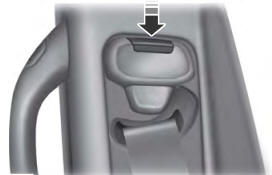Ford Explorer: Front End Body Panels / Removal and Installation - Hood
Ford Explorer 2020-2026 Service Manual / Body and Paint / Body and Paint / Front End Body Panels / Removal and Installation - Hood
Removal
NOTE: Removal steps in this procedure may contain installation details.
-
Detach the windshield washer hose coupling.
.jpg) |
-
Detach the windshield washer hose pin-type retainers from the hood hinge.
.jpg) |
-
On both sides.
Index-mark the hood hinge location to aid in hood installation.
.jpg) |
-
Remove the nuts and the hood.
Torque: 159 lb.in (18 Nm)
.jpg) |
-
NOTE: This step is only necessary when installing a new component.
Remove the pin-type retainers and the hood insulation.
.jpg) |
-
NOTE: This step is only necessary when installing a new component.
Detach the retainers, couplings and remove the windshield washer hose.
.jpg) |
-
NOTE: This step is only necessary when installing a new component.
Remove the nuts and the striker latch.
Torque: 80 lb.in (9 Nm)
.jpg) |
-
NOTE: This step is only necessary when installing a new component.
Remove the pin-type retainers and the weatherstrip.
.jpg) |
Installation
-
To install, reverse the removal procedure.
-
Check the hood alignment. Align the hood as necessary.
Refer to: Hood Alignment (501-03 Body Closures, General Procedures).
 Removal and Installation - Fender Splash Shield
Removal and Installation - Fender Splash Shield
Removal
NOTE:
Removal steps in this procedure may contain installation details.
NOTE:
LH side shown, RH side similar.
Remove the wheel and tire...
 Removal and Installation - Radiator Grille Opening Panel
Removal and Installation - Radiator Grille Opening Panel
Removal
NOTE:
Removal steps in this procedure may contain installation details.
Remove both the headlamps.
Refer to: Headlamp Assembly (417-01 Exterior Lighting, Removal and Installatio..
Other information:
Ford Explorer 2020-2026 Service Manual: Removal and Installation - Rear Thermostatic Expansion Valve
Removal NOTICE: During the removal or installation of components, cap, tape or otherwise appropriately protect all openings and tubes/fittings to prevent the ingress of dirt or other contamination. Remove caps, tape and other protective materials prior to installation...
Ford Explorer 2020-2026 Service Manual: Removal and Installation - Brake Caliper
Removal WARNING: Service actions on vehicles equipped with electronic brake booster and electronic parking brakes may cause unexpected brake application, which could result in injury to hands or fingers. Put the brake system into service mode prior to servicing or removing any brake components...
Categories
- Manuals Home
- 6th Generation Explorer Owners Manual
- 6th Generation Explorer Service Manual
- Body and Paint
- Automatic Transmission - 10-Speed Automatic Transmission – 10R60
- Electric Parking Brake
- New on site
- Most important about car
Seatbelt Height Adjustment
WARNING: Position the seatbelt height adjuster so that the seatbelt rests across the middle of your shoulder. Failure to adjust the seatbelt correctly could reduce its effectiveness and increase the risk of injury in a crash.

Copyright © 2026 www.foexplorer.com
